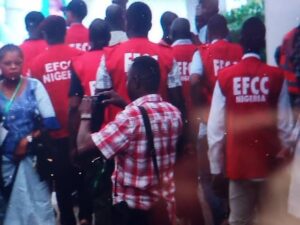Tensions Rise as Governors Clash Over Legality of EFCC in Supreme Court Showdown
Tensions Rise as Governors Clash Over Legality of EFCC in Supreme Court Showdown

EFCC in Party
The 36 state governors are at odds regarding a Supreme Court case questioning the legality of the Economic and Financial Crimes Commission (EFCC).
As the case was heard on Tuesday, three governors attended the National Summit on Cybercrime in Abuja, an event organized with the support of the European Union-funded Rule of Law and Anti-Corruption (RoLAC II) Programme of International IDEA. The governors present included Kwara State Governor AbdulRahman AbdulRazaq, Katsina State Governor Dikko Umar Radda, and Dauda Lawal of Zamfara State.
Governor Lawal remarked that he was not aware of the legal proceedings until the event and expressed his commitment to supporting the EFCC, even offering to provide office space for the commission in Zamfara. When questioned about any concerns regarding potential EFCC investigations, he stated, “I am not afraid of the EFCC because I have nothing to hide. It’s those with something to conceal who fear the EFCC.”
Other governors at the summit echoed this sentiment, voicing their unwavering support for the EFCC and its initiatives.
The legal challenge, brought forth by the Kogi State government alongside 15 other states, aims to contest the EFCC’s legality and the constitutionality of the laws that established it. The states involved include Ondo, Edo, Oyo, Ogun, Nasarawa, Kebbi, Katsina, Sokoto, Jigawa, Enugu, Benue, Anambra, Plateau, Cross River, and Niger. Recently, Imo, Bauchi, and Osun joined the suit, while Anambra, Adamawa, and Ebonyi withdrew.
On Tuesday, the Supreme Court postponed its ruling on the matter, with a date for the decision to be announced later. The plaintiffs argue that the EFCC Establishment Act did not adhere to Section 12 of the 1999 Constitution when incorporating the UN Convention against Corruption, which should have required approval from the majority of state legislatures.
The petitioners contend that since the necessary legislative approval was not obtained, the EFCC’s formation is unconstitutional and should be deemed illegal.
During the hearing, the Attorney-General of the Federation, Lateef Fagbemi, SAN, sought the court’s permission to submit a new response, which Justice Uwani Abba-Aji granted. Meanwhile, attorney Mohammed Abdulwahab, representing the plaintiffs, pointed out discrepancies in the Attorney General’s amended filings compared to the original documents, leading to the dismissal of the earlier submissions.
The states involved in the lawsuit against the Attorney-General of the Federation include Kogi, Kebbi, Katsina, Sokoto, Jigawa, Enugu, Oyo, Benue, Plateau, Cross River, Ondo, Niger, Edo, Bauchi, Imo, Osun, Nasarawa,Ogun, and Taraba.
TRENDING SONGS
 Shock in Anambra: Bride Disappears Moments Before Wedding
Shock in Anambra: Bride Disappears Moments Before Wedding
 Nigerian Woman Returns ₦330 Million Accidentally Credited to Her Account
Nigerian Woman Returns ₦330 Million Accidentally Credited to Her Account
 APC Don Reach Morocco?’ VeryDarkMan Reacts to Seyi Tinubu Poster
APC Don Reach Morocco?’ VeryDarkMan Reacts to Seyi Tinubu Poster
 Bride Breaks Down in Tears as Wedding Meals Were Kept Secretly While Guests Go Home Hungry
Bride Breaks Down in Tears as Wedding Meals Were Kept Secretly While Guests Go Home Hungry
 Odogwu by Day, Robber by Night: How Marriage Joy Turned Into Tragedy
Odogwu by Day, Robber by Night: How Marriage Joy Turned Into Tragedy
 Nigerian Officials Allegedly Pocket N4–6B Weekly Through Smuggling Cartels at Seme–Badagry Border
Nigerian Officials Allegedly Pocket N4–6B Weekly Through Smuggling Cartels at Seme–Badagry Border
 Ahmad Yerima: Naval Officer to Face No Sanctions After Clash with Wike – Matawalle
Ahmad Yerima: Naval Officer to Face No Sanctions After Clash with Wike – Matawalle
 Trending Video: Muslim Man Joins Wife in Hallelujah Challenge ‘Dress Like Your Miracle’ Night
Trending Video: Muslim Man Joins Wife in Hallelujah Challenge ‘Dress Like Your Miracle’ Night
 Woman Seeks Advice as Late Brother’s Wife Refuses to Mourn Him Following His Death With Alleged Mistress
Woman Seeks Advice as Late Brother’s Wife Refuses to Mourn Him Following His Death With Alleged Mistress
 Nobody Cares About Fine Girls In The UK, I Miss Nigeria — Nigerian Lady Laments
Nobody Cares About Fine Girls In The UK, I Miss Nigeria — Nigerian Lady Laments
Share this post with your friends on ![]()













